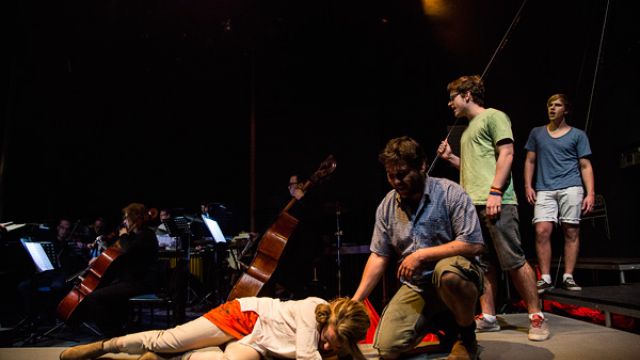From a Black Sky
This modern opera, set in Canberra’s January 2003 bushfires, conveys modern materialist sentiments and emotional shallowness through appropriately banal lyrics and atonal music.
From a Black Sky comes complete with all mod cons—mobile phones, home insurance, self-indulgent melodrama, Public Service doublespeak, and a lesbian affair—which could have made its audience more at home by functioning as mere fixtures and fittings rather than as the hearth around which the action occurs. This is, after all, ostensibly a tale of human drama, catastrophe, and tragedy; of jealousy, poor judgement, loss, and lasting guilt. To have the high points of a duet focus on lyrics of such banality as “not enough money” or “I have to go shopping” may therefore devalue the singing character’s depth and squander the intelligent listener’s patience.
The music is clever. By and large, the melodies are not such as you can possibly remember without a classical training; if you did remember them, they’d sound wrong anyway. So it’s a brave little orchestra, a braver vocal ensemble, and courageous principals who took on the challenge of translating into sound a strange, discordant, dramatic score that, upon reading, even the classically trained would have trouble in internally hearing.
But at the end of Act One, and twice again toward the end of Act Two, the emotional constancy of the work’s unrelentingly fractious dissonance was relieved by a burst of refreshing tonality, recognisable harmony, and harmonic cadences, blossoming in the work’s few precious minutes of emotionality, and underscoring musical communication’s utter dependence upon melodic and harmonic progression.
Yet, of such challenging (if emotionally constrained) material—of a score embracing an atonality hostile to human sensibilities—the cast, chorus, and instrumental ensemble somehow managed, cued by an alert conductor, to make musical sense.
The instrumental ensemble overpowered the chorus at times, but, with consistent effort, the principals—Judith Dodsworth, as Sophie; Don Bemrose, as Tony; David Rogers-Smith, as David; and, as Amelia, the internationally recognised Canberran Rachael Duncan—cut through it well enough. An additional challenge arises, however, through a combination of a powerful instrumental backing and a plethora of lyrics. A powerful singer’s broad vibrato will often obscure the vowel sound, and even the note, intended; so lines of essential information sung high and powerfully, as many of the female principals’ lines were, tend to invoke a vibrato that obscures their meaning as well, at times, as their music.
But although the prolix lyrics were, for this reason, sometimes impossible to discern, all four principals delivered remarkable performances musically; and, fortunately, they clearly communicated emotions bodily and facially. Both singing and playing were consistently excellent, even if anybody not hardened to atonal music could be forgiven for imagining that the instruments and the singers had been unable to come to any agreement on the key.
One could convey this tale in three sentences or a short song; instead, the characters enter into the minutiae of everyday suburban banalities to make of them an opera unburdened by emotion. If you want to be moved, to take an emotional journey through music, then you can always see a competent production of La Traviata or The Magic Flute. But if you’re after a musical experience that is new and different—one that reflects an increasingly common ability to turn inattention and faithlessness to shrewd advantage through ambiguity and confusion, and that won’t invoke unwelcome feelings—then this work will be worth your two and a half hours.
John P. Harvey
Image: Rachael Duncan and Don Bemrose (centre), in From a Black Sky. Photographer: Lorna Sim.
Subscribe to our E-Newsletter, buy our latest print edition or find a Performing Arts book at Book Nook.

